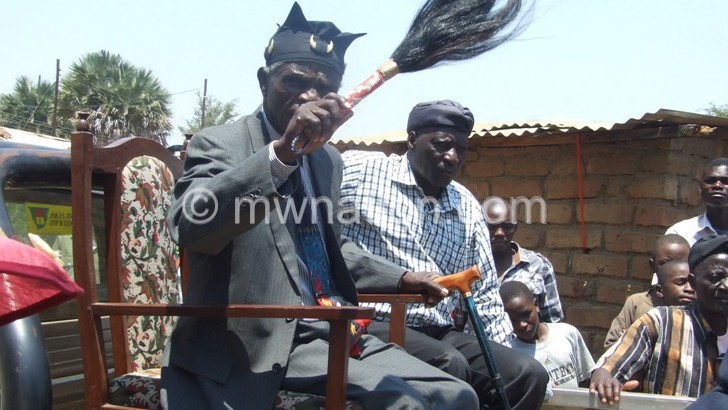‘If you lose the foreskin for a benefit, you’ll not have lost’
The way people conduct themselves when they come to visit him at his compound—whose entry has a wooden tower with a carved image of an owl resting on it on one side and another with a leopard on it on the other—tells you how respected a chief he is.
On their knees they walk as they get closer to him to offer their greetings. They will roll on their sides or stand on their knees and clap hands while saying Eee Sabira.

Paramount Chief Chikulamayembe is an imposing figure among the Tumbuka people of Rumphi in the Northern Region. When you attend the annual Gonapamuhanya ceremony—which commemorates the Chikulamayembe dynasty—you will learn that his authority stretches into neighbouring Zambia from where people also come for the event.
His is a tribe where a foreskin explains the traditional place males occupy in society and has a role to play during sex.
“Culturally, it is believed that the foreskin has got a lot of job to do during sex. We enjoy sex, we believe, because of the foreskin,” says Paramount Chief Chikulamayembe.
That is a belief he has to uphold as the chief custodian of his people’s culture. It is their identity as in some way it trumpets the difference they hold from other tribes.
But mention HIV and Aids, you will see how Chikulamayembe’s resolve, to keep the foreskin as his people’s traditional identity, melts. And for a second, you should think he is not fit to lead his people and get the respect they give him.
“We are talking about something concerning life,” he says with a smile that also infects you. “Although I am a custodian of the Tumbuka culture, I have to look into important issues of life.
“In the wake of HIV and Aids, circumcision should take place to save our lives from this disease although it [circumcision] is not a complete solution in itself.
“This is why I reckon that it is my duty, as a chief, to mobilise fellow chiefs and our people to go for it. If you lose the foreskin for a benefit, you will not have lost at all.”
In 2007, the World Health Organisation (WHO) and the Joint United Nations Programme on HIV and Aids (UNAids) issued recommendations to implement Voluntary Medical Male Circumcision (VMMC) in settings with high HIV prevalence and low male circumcision uptake.
This was designed to improve and strengthen efforts to combat HIV after research conducted in Uganda, Kenya and South Africa showed that the procedure cuts the risk of a man contracting HIV from a woman living with it by 60 percent. Recent studies suggest that VMMC may cut that risk by up to 75 percent.
According to Bwanalori Mwamlima, Rumphi District Health Office (DHO) spokesperson, Rumphi District has an HIV prevalence rate of six percent against a 2014 national prevalence rate of 10.8 percent, according to UNAids.
He says the district does not have statistics on the prevalence rate for distinct regions—west, central or east—which might be higher or lower depending on activities exposing people to the virus.
According to various statistics, HIV prevalence rates are higher in lakeshore areas than they are in inland areas. The east of Rumphi is on the shores of Lake Malawi, a key tourist attraction feature.
The dwarf district’s prevalence rate, though, does not give Chikulamayembe time to celebrate. Being a non-circumcising tribe, just like most tribes in the Northern Region, his people are not beneficiaries of what VMMC offers. And they are polygamous which means they do not practise faithfulness to one partner.
Undocumented evidence also reveals that there are movements that put people at the risk of contracting HIV.
During the tobacco selling season, men from the district spend time waiting for their tobacco to be sold at the floors in Mzuzu where, it is said, they engage services of sex workers. According to the 2015 Malawi Aids Response Progress Report, sex workers have a HIV prevalence rate of 70 percent.
It is also said that during such seasons, the sex workers respond to the lure of money and move around the district, knowing that the men would spend some of their earnings at an entertainment joint somewhere.
Rumphi District is also known for some cultural practices that fuel the spread of HIV. Among them are Chihalo in which a man is allowed to inherit her deceased brother’s wife and Vithulo where parents-in-law send teams of people—young and old—to visit each other. During such events, they drink and dance all night long.
“VMMC saves life. As a chief, I know that there is no culture to a dead person,” says Chikulamayembe, echoing the words of Chief Mumena of Zambia, whose tribe is non-circumcising like the Tumbuka, but he and his son underwent VMMC to reduce the impact of the HIV scourge. He also encouraged his people to circumcise, stressing that there is no culture to protect when everyone is dead.
He says those that have undergone the procedure should encourage their sons and friends to also undergo it, adding that the sensitisation he has received about VMMC “leaves me with no doubt that it is useful.”




